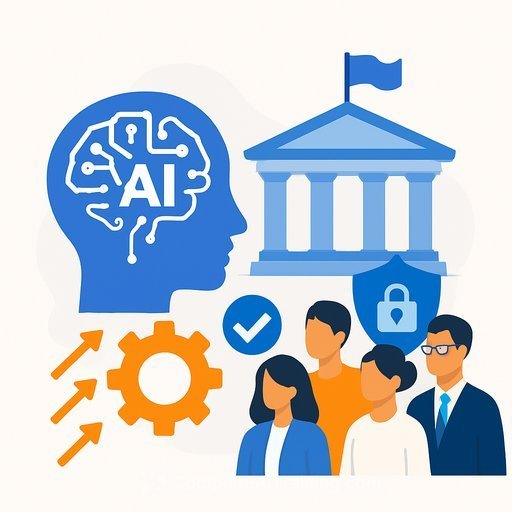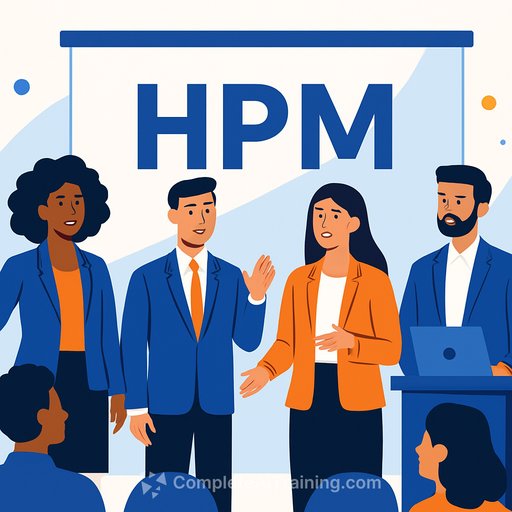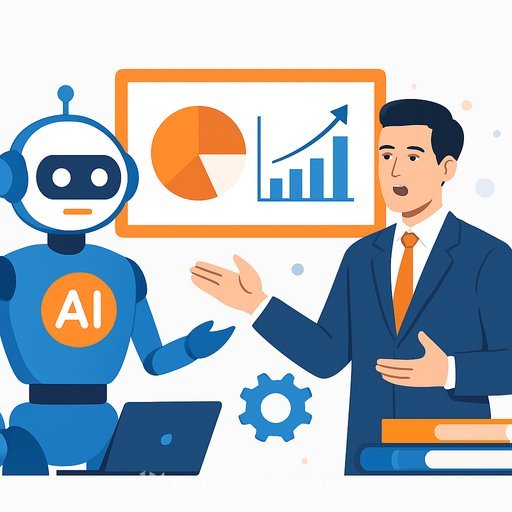Will AI Replace HR Jobs in Portugal? What to Do in 2025
Short answer: no. AI won't wipe out HR jobs in Portugal in 2025. It will automate a big slice of admin (up to 46%) and reshape parts of rewards work (~52%). Meanwhile, about 60% of EMEA employees already use GenAI daily.
Your priorities: GDPR-aligned governance, targeted reskilling, small pilots with clear metrics, and internal mobility. Treat AI like a high-speed train: build the timetable, crew, and safety checks before you scale.
Where HR in Portugal stands in 2025: AI trends and stats
Portugal has strong digital infrastructure (near-full 5G and gigabit) but modest enterprise AI adoption. Employees are moving faster than organisations.
- 60% of EMEA employees use GenAI daily; strategy and measurement lag.
- Many organisations report AI use, but fewer have a clear plan or manager enablement.
- For HR, that means start with governance and skills before tooling sprawl creates risk.
Think Lisbon and Porto as remote-work magnets, with Madeira and Sagres close behind. Talent expectations are global; compliance is local.
HR roles most at risk in Portugal (short-to-medium term)
- Admin-heavy roles (data entry, secretarial, routine payroll/benefits): up to 46% of tasks automatable.
- Total rewards: roughly 52% of some tasks impacted by AI.
- HR shared services: repetitive tickets will shrink via chatbots and workflow automation.
Implication: reduce repetitive load, then redeploy people into analysis, experience design, and governance work.
HR roles that will grow or newly appear in Portugal
- People analytics / talent intelligence: retention, flight-risk, internal mobility.
- L&D and reskilling designers: job-based AI upskilling paths and manager enablement.
- AI governance & ethics leads: bias testing, DPIAs, vendor oversight, audit trails.
- HR-tech implementers / AI-ops: secure integrations, workflow design, change management.
- Digital employee experience / chatbot managers: 24/7 support, content accuracy, feedback loops.
Business impacts and organisational design changes in Portugal
- Faster hiring and screening with automated tools; tighter time-to-hire for scarce roles.
- Task redesign over job cuts; more frequent redeployment and internal moves.
- Closer HR-IT partnership to secure data flows and align with GDPR/AIA.
- Hybrid-first teams for Lisbon/Porto hubs and international talent.
Key risks for Portugal HR: bias, privacy (GDPR), security and morale
- Bias: audit high-risk use cases (screening, promotion). Add human oversight and explainability.
- Privacy: CNPD is strict; Law 58/2019 limits biometric/surveillance use. Run DPIAs and minimise data.
- Regulatory sanctions: GDPR can reach €20M or 4% of turnover; the EU AI Act includes higher tiers for serious breaches.
- Security: vendor access, data leakage, model poisoning. Lock down integrations and contracts.
- Morale: silent automation erodes trust. Communicate, consult, and train managers early.
Useful references: EU AI Act overview and Portugal's CNPD.
Practical 2025 action plan for HR teams in Portugal
- Run a quick audit: list repetitive tasks in payroll, onboarding, time-tracking, and HR tickets.
- Consolidate systems into an API-friendly HRIS to avoid spreadsheet drift.
- Launch 3 low-risk pilots: payroll/time automation, onboarding workflows, and an employee chatbot.
- Measure hours reclaimed (target: 20+ hours/week across pilots) and reinvest into reskilling and internal mobility.
- Compliance by design: DPIAs, data minimisation, role-based access, vendor clauses aligned to GDPR/AIA.
- Manager enablement: simple playbooks, Q&A sessions, and escalation paths.
- Works council/employee consultation: document decisions and feedback loops.
Reskilling and redeployment pathways for Portuguese HR staff
- Run a skills audit: data literacy, AI tool fluency, prompt writing, change skills.
- Create bridge roles: prompt reviewer, AI output auditor, chatbot content owner.
- Cohort training: e.g., "AI Essentials for Work" (15 weeks; foundations, prompt writing, job-based projects; early-bird approx. $3,582).
- Talent marketplace + talent intelligence: surface hidden skills and move faster on internal fills.
- Measure outcomes: internal fills, promotions, skill closures, hours redeployed - not just course completions.
Need curated options? Explore practical AI courses and certifications for HR at Complete AI Training.
Case studies & signals to watch in Portugal (and why they matter)
- GenAI in HR shared services: biggest, cleanest productivity wins with governance baked in.
- Employee chatbots/digital concierges: can deflect most routine queries when scoped well.
- Talent intelligence for internal mobility: reduces hiring spend and protects morale.
Choose pilots that free 20-40 hours per month and have clear privacy controls. Scale what proves value.
Checklist and 90-day roadmap for Portuguese HR leaders
- Days 1-30: fix onboarding basics (contracts, payroll in euros, devices, access), assign buddies, run 1:1s, map repetitive tasks.
- Days 31-60: select 3 pilots, complete DPIAs, tighten vendor terms, enable managers, set success metrics.
- Days 61-90: launch pilots, report hours saved, publish a short internal update, and open internal mobility paths.
Conclusion: Will AI replace HR jobs in Portugal?
No wholesale replacement. Expect task redesign, faster processes, and new roles in analytics, L&D, and governance. The real risk isn't AI - it's weak governance and no skills plan.
Run small, measurable pilots. Build GDPR/AIA controls in from day one. Redeploy talent into higher-value work and keep trust high with clear communication.
Frequently Asked Questions
Will AI replace HR jobs in Portugal in 2025?
No. It will automate a large slice of admin and parts of rewards while creating demand for analytics, L&D, governance, and implementation roles. Treat this as task redesign.
Top legal and compliance risks?
GDPR and CNPD expectations, bias/explainability, vendor security, and EU AI Act obligations. Run DPIAs, minimise data, add human oversight, and lock down contracts.
What should HR do first?
Audit repetitive work, launch 3 low-risk pilots, measure hours saved, and reinvest in reskilling and internal mobility. Keep managers and works councils involved.
Who is most exposed and who grows?
Most exposed: admin-heavy roles (data entry, secretarial, routine payroll/benefits). Growth: people analytics, L&D designers, AI governance, HR-tech implementers, and chatbot managers.
How to reskill fast?
Short cohort programs focused on AI at work, prompt writing, and job-based projects; bridge roles for output auditing and chatbot ownership. Track promotions, internal fills, and hours redeployed. See curated learning paths at Complete AI Training.
Check out next
ISO/IEC 42001:2023 - why an AI management system standard helps you design responsible hiring and monitoring processes that pass audits and build trust.
Your membership also unlocks:






